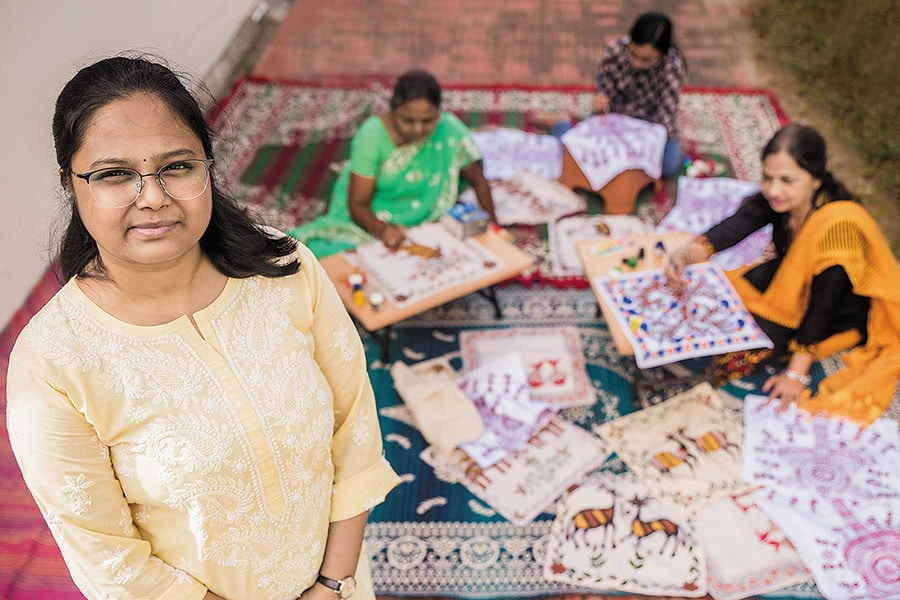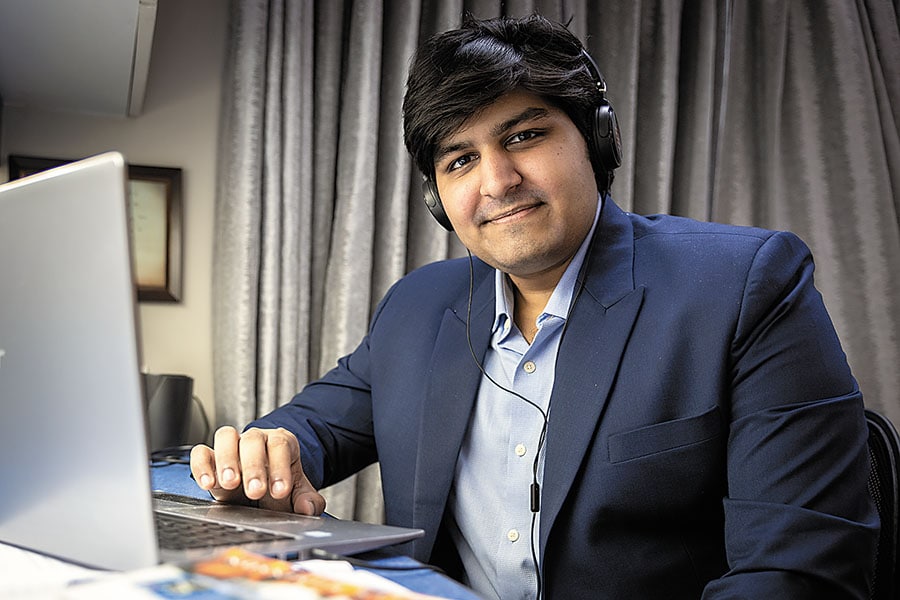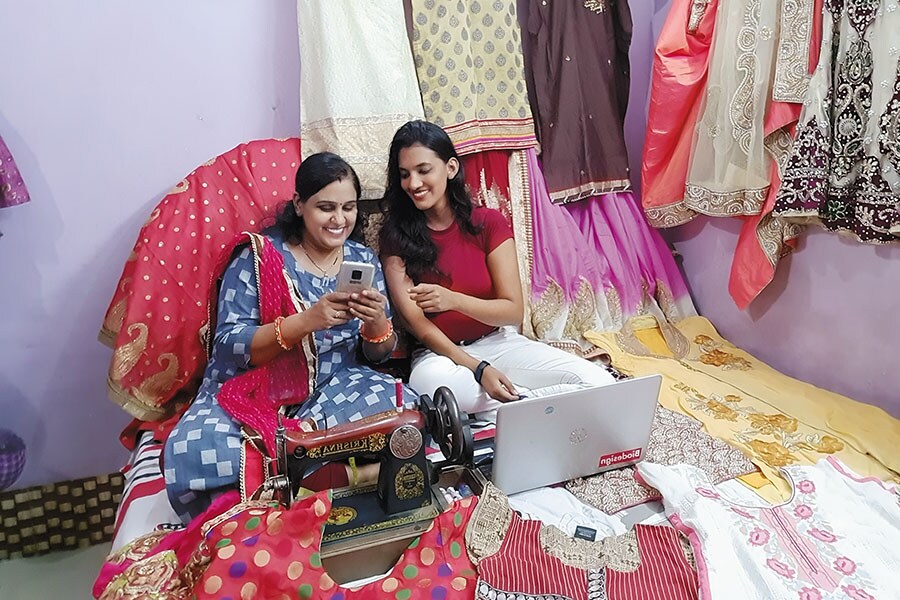Laid off during Covid-19, these employees turn entrepreneurs
After being laid off, several youngsters are launching their own ventures instead of taking the conventional job-seeking route


 Priyanka Subarno was laid off by a civil society organisation in Delhi in May. Along with ex-colleague Manna Beck, she then launched Tribespun, which aims at reviving dying indigenous art forms Image: Kaushik Verma[br]It was supposed to be a landmark year for Akshay Sirsalewala: Graduation from the Indian Institute of Management (IIM)- Kozhikode in April, marriage in May and a new job in June. But the pandemic struck, resulting in his wedding—which was supposed to be attended by 800-odd guests—reducing to a low-key, 20-people affair. His joining date with the PwC US Advisory in Bengaluru was deferred to January 2021. “I understand that my employer’s intention was good—like many companies they could have fired me, which they did not. But when such things hit you, positive thoughts are not the first things that come to your mind,” says the 27-year-old Mumbai resident.
Priyanka Subarno was laid off by a civil society organisation in Delhi in May. Along with ex-colleague Manna Beck, she then launched Tribespun, which aims at reviving dying indigenous art forms Image: Kaushik Verma[br]It was supposed to be a landmark year for Akshay Sirsalewala: Graduation from the Indian Institute of Management (IIM)- Kozhikode in April, marriage in May and a new job in June. But the pandemic struck, resulting in his wedding—which was supposed to be attended by 800-odd guests—reducing to a low-key, 20-people affair. His joining date with the PwC US Advisory in Bengaluru was deferred to January 2021. “I understand that my employer’s intention was good—like many companies they could have fired me, which they did not. But when such things hit you, positive thoughts are not the first things that come to your mind,” says the 27-year-old Mumbai resident.
Sirsalewala did not want to just sit at home for 10 months without earning and decided to utilise the time more productively. Along with his friend Utkarsh Kumar, who graduated from the same business school, he started ‘Mentorship Series’ in April to guide incoming postgraduate students and final year undergraduate students with a structured placement preparation process. “We started with one-to-one [online] sessions, targeting postgraduate students and chartered accountants (CA). Then, to reach a wider audience, we started tying up with colleges by finding the right people on LinkedIn, connecting with them and convincing them to host us,” explains Sirsalewala, who is a CA and has cleared all levels of Chartered Financial Analyst and Financial Risk Manager.
Sirsalewala and Kumar faced many rejections initially, but after hosting about five webinars for colleges like Shri Ram College of Commerce, Aligarh Muslim University, Deen Dayal Upadhyaya College and so on, they started getting multiple queries. The duo charges ₹750 for a one-to-one 75-minute counselling session and ₹4,000 per college seminar of the same duration. In five months, they’ve mentored over 500 students. Sirsalewala and Kumar, who say they are learning on-the-job with each seminar, plan to scale up this business and take it forward even after they start working. “We hope that five years later, most B-school and undergraduate students interested in consulting will have heard about us. We are also evaluating launching a monthly newsletter, where we will feature articles by successful professionals and our learnings over the years,” explains Sirsalewala.
According to a recent survey conducted in the wake of the pandemic by First Naukri, an end-to-end campus hiring platform of online recruiter naukri.com, 51 percent fresh graduates who have received a job offer said their joining dates have been pushed ahead, while 10 percent have had their offers rolled back. One such student is Pooja Goel. She was supposed to join a digital business transformation company in April after completing an MBA in marketing from the Institute of Management Technology, Ghaziabad. The company kept delaying the joining date and after a point, stopped answering her calls. “It was a hint that the job isn’t in my hands anymore,” she says.
Goel, who was initially clueless on how to deal with her situation, decided to launch Pink Collar Professionals, a platform that caters to women-led small businesses and helps them scale up through product and brand campaign ideas, social media content strategy and audits, digital marketing and so on.
 Clockwise from top: IIM graduates Akshay Sirsalewala and Utkarsh Kumar started ‘Mentorship Series’ in April to guide students Sandeep Sinha launched his startup ANS Finserv after he was asked to go by his firm journalist Gautam Mengle created a website for cybercrime news after he was sacked Image: Akshay: Arpit Jain For Forbes India“While I was studying, I used to attend startup events, summits and conferences, where I almost never saw any women on the panel as well as in the crowd. I know women’s participation has considerably increased but we’re not there yet,” says the 27-year-old, who launched this venture with her personal savings of ₹20,000.
Clockwise from top: IIM graduates Akshay Sirsalewala and Utkarsh Kumar started ‘Mentorship Series’ in April to guide students Sandeep Sinha launched his startup ANS Finserv after he was asked to go by his firm journalist Gautam Mengle created a website for cybercrime news after he was sacked Image: Akshay: Arpit Jain For Forbes India“While I was studying, I used to attend startup events, summits and conferences, where I almost never saw any women on the panel as well as in the crowd. I know women’s participation has considerably increased but we’re not there yet,” says the 27-year-old, who launched this venture with her personal savings of ₹20,000.
She started with creating awareness about her startup through different Facebook groups, communities and pages for women entrepreneurs, and many people showed interest. “Starting my own venture was a huge step to take amid the pandemic when many businesses were finding it tough to survive. But I didn’t want to sit idle and waste time when I already had skills to utilise,” she adds.
Goel has provided digital support to 30 women entrepreneurs to help scale up their businesses, which ranged from edtech and online gifting to clothing and handmade jewellery. She is also providing digital skills training to rural women in partnership with Smile Foundation and aims to reach 10,000 women in the next two years. Pooja Goel’s Pink Collar Professionals gives support to women entrepreneurs to scale up their businesses. The venture was formed after the company that hired her stopped taking her calls
Pooja Goel’s Pink Collar Professionals gives support to women entrepreneurs to scale up their businesses. The venture was formed after the company that hired her stopped taking her calls
India’s growth suffered its worst fall on record in the April-June quarter, with the gross domestic product contracting 23.9 percent. According to the Centre for Monitoring the Indian Economy, the unemployment rate reached 27.1 percent in early May as 122 million Indians lost their jobs between March and April.When Sandeep Sinha, a senior procurement manager at Studiokon Ventures in Delhi, was winding up with what he thought was just another work day in July, his manager called, saying the company has decided to let him go due to an ongoing financial crisis. “It was really tough to digest. I was in trauma for 15 days, but my wife supported me and helped me come out of it,” says the 35-year-old. With nine years of work experience, Sinha knew finding a job amid the pandemic would be tough. Still, he applied for 400 open positions, but with no positive outcome.
“The market is still welcoming people with 0-2 years of experience or someone having 20-plus years of experience. The real problem of the pandemic is for people in the middle, either economic class wise or work experience wise,” says Sinha, who didn’t want to waste time looking for jobs and launched his own startup, ANS Finserv, in August.
With an investment of up to ₹3 lakh from personal savings, Sinha decided to help people around their financial concerns. “ANS Finserv helps clients build up some corpuses to secure their future against events like Covid-19,” he says.
Bajaj Finserv, ICICI Bank, HDFC Bank, Future Generali, Digit Insurance are some of its customers. “We’re under process in signing contracts with the State Bank of India, HDFC Life, Tata Capital, Kotak Mahindra Bank, RBL and Citibank. We want to be a 200-plus employee organisation with a target revenue of ₹60 crore by the end of FY23-24. We have started working on multiple products like insurance, loans, billing software,” says Sinha.
Some of the sectors severly affected by the pandemic include food service, travel, retail, real estate and recreation. Several media houses also laid off employees during and after the national lockdown. One of them is The Hindu, which decided to scale down editorial operations in Mumbai. “I was covering crime for the Mumbai edition of The Hindu. About 20 of my colleagues, including me, were laid off in June... June 30 was our last day at work,” recalls 34-year-old Gautam S Mengle, who was associated with the 142-year-old newspaper since its Mumbai edition was launched five years ago.
Without wasting time, Mengle got together with his mentor S Hussain Zaidi, a veteran crime journalist and author, to start working on a media website. “We just got talking about how cybercrime doesn’t get the dedicated coverage it deserves, and how most news reports on it are riddled with jargon and published [mostly] by tech news portals,” says Mengle. On August 15, they launched CySpy India, a website which aims to simplify cybercrime and cyber security for the lay reader.
Mengle is also working on a few other projects simultaneously, including research for a web series and fact-checking a manuscript for a publishing house, till the website starts generating profits. “It helps to have a side hustle while your business finds its feet. It takes away the stress of paying the next month’s rent or EMI and also gives you something to do apart from your business. At the same time, I am doing what I love about my job—reporting the news,” he adds.
The Covid-19 crisis has prompted many companies to reconsider their workforce planning strategy, according to Paul Dupuis, MD and CEO of Randstad India, a human resource consulting firm. “This has raised awareness about contingent and temporary labour. There is a clear shift in many organisations toward increasing the percentage of this segment of the workforce, allowing for agility and flexibility of scaling up in good times and scaling down in challenging times.”
Priyanka Subarno, 29, was employed with a civil society organisation in Delhi. Despite working long hours while managing household chores, she was laid off in May. “I worked with them for 10 months and despite giving more than 100 percent, they fired me. That’s when I decided I wouldn’t work for anyone... I’d rather be my own boss.”
Subarno launched Tribespun with her ex-colleague Manna Beck in July. The venture aims at reviving dying indigenous art forms by helping people in tribal areas to use their skills for creating modern lifestyle and utility-based products. “We work toward turning regional art forms into a viable market product with the primary goal of supporting the artisans associated in handcrafting each piece,” says Subarno.
Tribespun has 25 artisans associated with it, out of which 20 are from Jharkhand and the rest from Madhubani, Bihar. The focus is on providing the artisans with work on a regular basis, offering them fair wage rates without negotiations. “Our profit margins are very low at the moment since the focus is mainly on laying a strong foundation for the business before we expand our products line,” adds Subarno, who is selling these handicraft items via social media and website.
 With friend Sreejita Mukherjee, chef Bhargav Joshi started The Bela’s Cucina, a takeaway service of Italian cuisine, in Valsad, Gujarat, after he lost his job in Mumbai
With friend Sreejita Mukherjee, chef Bhargav Joshi started The Bela’s Cucina, a takeaway service of Italian cuisine, in Valsad, Gujarat, after he lost his job in Mumbai
While Subrano has no regrets and considers the layoff as an opportunity to pursue something she is passionate about, it’s not been that simple for Bhargav Joshi, who was a chef with Gustoso, an Italian restaurant in Kemps Corner, Mumbai. After being laid off in July, he was extremely worried for his family of nine who were dependent on his earnings after their food business shut down in the wake of the lockdown. “We were devastated and didn’t have enough money to pay the loans or even the fixed costs of our food business. I could see that the worst was coming our way,” says Joshi, who is now home with his family in Valsad, Gujarat.
In August, along with his friend Sreejita Mukherjee, an HR professional who was also laid off, the 22-year-old decided to open a food takeaway and delivery service of Italian cuisine, which is his area of specialisation. “We did research and trials for a month and when we saw the situation was getting better and people started living the new normal way, we decided to open The Bela’s Cucina in Valsad,” says Joshi, who personally prepares the orders at home as well as delivers them.
In the initial weeks, The Bela’s Cucina was receiving 15 orders per day but later Joshi started taking only 10 orders daily so that he can manage cooking and delivering the food. After establishing themselves in Valsad, the duo plans to get on to delivery platforms like Zomato and Swiggy. “Once the situation gets better, we plan to expand our business to dine-in and set up outlets in cities like Ahmedabad and Surat,” says Joshi.
“Amid all its challenges, Covid-19 has provided us with the opportunity to step beyond the edge of our comfort zones,” says Dupuis. “If we look at the opportunity side of the unemployment coin, I am sure we can discover, explore and grab opportunities to not only survive the crisis, but also thrive. History has shown remarkable transformations for the better following major global crises—be it the Spanish flu, the Sars outbreak or the 2008 global financial crisis,” he adds. “I am confident that today’s temporary situation of job losses is, in fact, a trigger to exercise our muscle of resilience and innovation.”
First Published: Sep 18, 2020, 14:29
Subscribe Now